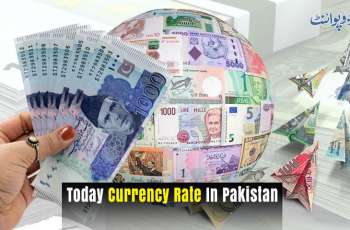A continuing economic crisis in Argentina requires currency reforms that would be more serious than the recently-reintroduced capital controls in order to avoid yet another episode of hyperinflation and subsequent Bitcoin growth, experts told Sputnik
MOSCOW (Pakistan Point News / Sputnik - 05th September, 2019) A continuing economic crisis in Argentina requires currency reforms that would be more serious than the recently-reintroduced capital controls in order to avoid yet another episode of hyperinflation and subsequent Bitcoin growth, experts told Sputnik.Argentina's main stock index Merval fell on Tuesday over 14 percent amid political and economic uncertainties that are haunting the country ahead of October presidential elections.
In order to support the financial market and stop the decline of the national currency, the Central Bank of Argentina reintroduced capital controls on Sunday, requiring banks to obtain preliminary authorization to distribute their earnings abroad. It also restricted access to the Argentine peso for large export companies in an effort to make them sell dollars.
The International Monetary Fund (IMF) is currently considering Argentina's suggestions concerning the restructuring of its debt to the organization amid the economic crisis.
ARGENTINA FLIRTING WITH HYPERINFLATION
Last month, the peso collapsed over 25 percent against the backdrop of the opposition alliance Front of All, led by Alberto Fernandez, winning primary elections over the Together for Change coalition of incumbent President Mauricio Macri.
"If Macri wants to win, he will have to freeze prices until after the election and try to slow inflation and the devaluation of the currency. Whoever wins the election will have to do a major currency reform immediately, including a maxi-devaluation and then set a tight-but-flexible peg of the peso to a currency basket based on the dollar and the euro," Carol Wise, associate professor of international relations at University of Southern California, told Sputnik.
Failing to implement drastic economic measures will only result in a further rise in inflation, she argued.
"There is no easy way out of this mess. If Macri loses, Argentina is flirting with yet another episode of hyperinflation. Very sad," Wise said.
Although the incumbent president failed to deliver the economic revival promised upon his appointment, his recent actions can still earn him additional votes needed to win the October elections, the expert said.
"Capital controls will not stop the currency crisis. It's too late for that. However, since his political opponents are running on a populist economic platform, Macri can win back some votes with this move," the expert explained.
Meanwhile, any major adjustment of the financial policies are unlikely to take place ahead of the presidential vote, according to the associate professor.
Another consequence of the economic crisis in Argentina is a spike in demand for Bitcoin in the country, especially after hard currency became restricted to only $10,000 for individuals per month.
"No doubt Bitcoin will allow for a market-based rate for the peso where cash can be exchanged on the black market to circumvent these restrictions. Bitcoin demand will spike and will be used as a money substitute and route of flight to safety," Charles Hayter from the Crypto Compare cryptocurrency data analysis firm told Sputnik.
Hayter argued that Argentinians had all the necessary tools at their fingertips "to make economies and information flow beyond the purview of corrupt and overbearing nation states."
"Argentina is no stranger to being buffeted by global macroeconomic conditions. We have seen innovative solutions for currency substitution in the past and Bitcoin is a natural solution similar to the privacy messaging apps being used in the Hong Kong protests," the cryptocurrency expert explained.
In 2018, the IMF agreed to disperse $50 billion to Argentina under the Stand-By Agreement with the Latin American country to help it cope with an economic downturn. The loan was subsequently boosted to $57 billion through 2021 after the country agreed to stricter fiscal measures, including deep spending cuts and higher taxes.




